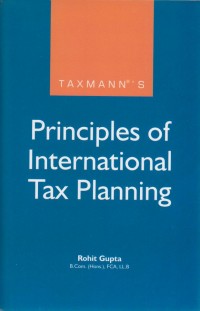
Book
Principles of International Tax Planning
From the Author The complexity of international taxation of multinational enterprises is evident to anybody engaged in advising, tax planning and litigation with respect to such cases. The international business community is faced with tax laws and tax treaties of very different natures, with the effect that strong efforts are required to achieve a tax neutral income and to avoid problems and sanctions by local tax authorities. "Principles of International Tax Planning" aims to provide readers with a basic knowledge of the tools currently used by multinational enterprises to benefit from the opportunities and overcome the problems created by the expansion of the market and globalization of economic activities. The purpose of the book is to give readers a brief idea on various international tax planning models and strategies in practice. The book highlights various ways to reduce the tax burden on cross-border transactions and entities. In particular, the book discusses what considerations should be involved in deciding holding company location, whether to choose a branch or subsidiary, how to manage the Intellectual property rights from creation to migration, how to minimize tax liabilities for globally mobile employees etc. Also, the book discusses in detail the various tax planning models for manufacturing, retail and distribution activities to ensure supply chain is tax efficient across the globe. Further, the book highlights the various types and models of hybrid financial instruments and hybrid entities for undertaking tax-efficient offshore financing. Also, use of tax havens and various offshore structures used in tax havens are discussed. The book also contains reported cases of international tax planning undertaken by many large groups to reduce their effective tax rates. Real life practice and structures of international tax planning are also demonstrated at various places using recent judicial decisions. The book examines international tax principles primarily from the view point of multinational group of companies. Planning techniques and models are described in a neutral and concise manner, without taking into account any specific jurisdiction. The book is intended to be of use both to taxpayers and their advisers in developing their strategies, and to governments and tax authorities in formulating their tax policies. The book is a sort of an essential reference manual intended to benefit everybody associated with the field of cross border tax planning. From the Back Cover A PRACTICAL GUIDE TO INTERNATIONAL TAX PLANNING INCORPORATING REAL LIFE CASE STUDIES, LATEST CASE LAWS,AND ILLUSTRATED TAX PLANNING STRATEGIES COVERING: Tax Mitigation Practices Tax Planning v. Avoidance v. Evasion Substantive and Formal Tax Planning Profit Migration Strategies Tax Planning Techniques Offshore Business Entities Permanent Establishment & Tax Planning Issues Formation of Offshore Holding Companies Use of Branch and Subsidiary Structures Intragroup Financing Hybrid Financial Instruments - Use of Repos, Inverted Repos etc. Hybrid Entities - Classic and Reverse Hybrid Models Tax Breaks from Asset Leasing, Double-dip Leasing, Defeasance Leasing, etc. Use of Derivatives as Tax Planning Tool Intellectual Property Management Tax Efficient Supply Chain Management - Models for Manufacturing, Distributorship and Retail Activities Global Mobility - Tax Planning Strategies to Reduce Expat Cost Tax Havens and Offshore Structures Real-life Case Studies of MNCs including Google, Amazon etc. Transfer Pricing and Transfer Mis-Pricing Anti Avoidance Measures, TIEAs and OECD 'BEPS' Action Plan
Detail Information
| Call Number |
07 PRI roh
|
|---|---|
| Publisher | Taxmann : New Delhi., 2015 |
| Collation |
417 p.; 24.8 cm
|
| Language |
English
|
| Classification |
07 PRI roh
|
| ISBN/ISSN |
978-93-5071-672-4
|
| Edition |
-
|
| Subject(s) |






